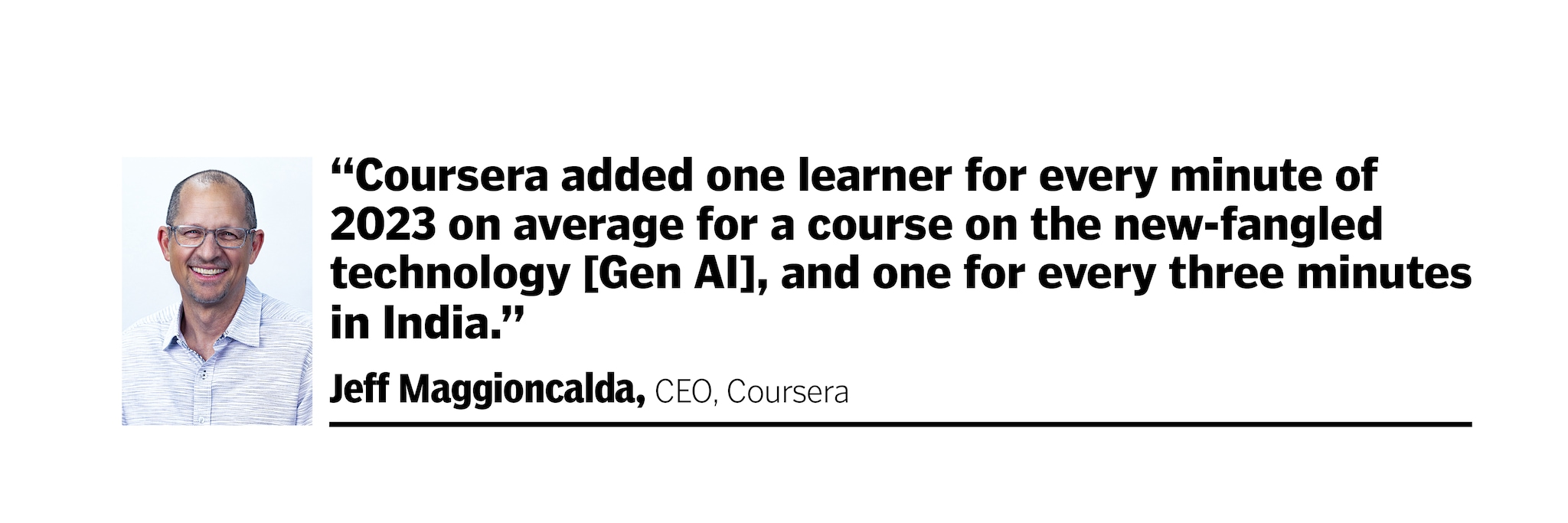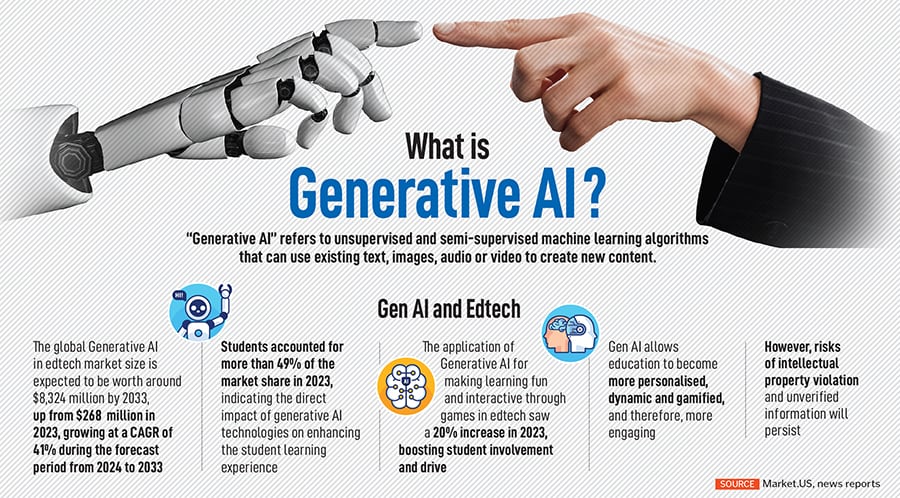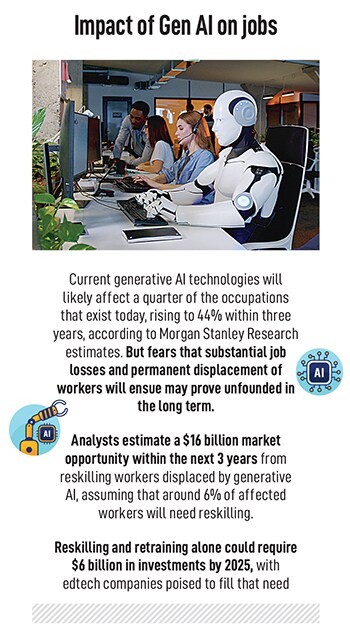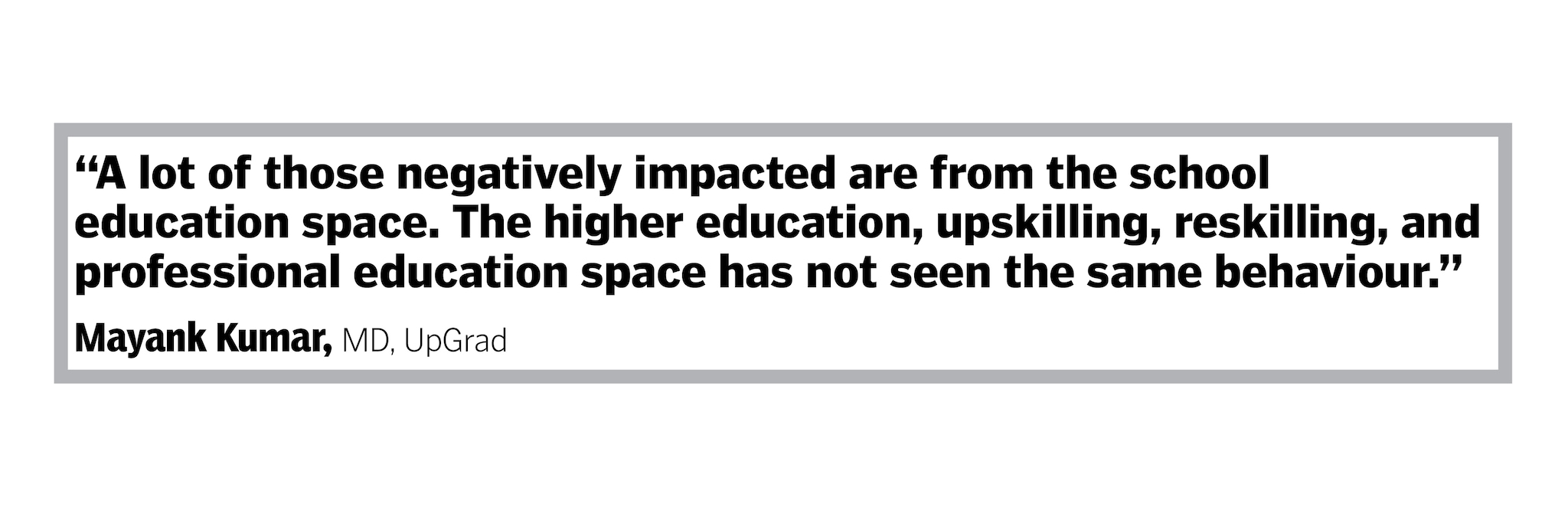The ‘revision bot’ is an application of artificial intelligence (AI), and more specifically, generative AI (Gen AI) that the edtech (education technology) sector is excited about. Now, when you’re unsure of a concept while going through study revisions, you can simply ‘ask’ the revision bot, who will trawl through content videos, text and so on and offer you a neat, conversational summary or explanation. Still have doubts? Ask again. And again. At any time of day.
Edtech is, perhaps, one of those sectors that’s going to see a disproportionate disruptive impact from Gen AI. In fact, US edtech giant Coursera’s CEO Jeff Maggioncalda says the advent of ChatGPT meant that he lost sleep for a good 45 days, tearing apart the nuts and bolts of the large language model. People wanted to learn about Generative AI, and fast, and industry would have to keep up.
When Maggioncalda logs on to a Zoom call with Forbes India from a Tokyo hotel room, a good 15 months after ChatGPT first took off, he’s on a long East-to-West journey that culminates in Boston, where he will speak at Harvard Business School about how companies can adapt to the world of Gen AI.
Coursera, he says, added one learner for every minute of 2023 on average for a course on the new-fangled technology—and one for every three minutes in India. The most popular course is on prompt engineering by Vanderbilt University, which, at the time of writing, more than 240,000 people had enrolled in, and which had an average rating of 4.8 stars.
In May 2023, in fact, Coursera had launched a big-bang hiring platform to rival LinkedIn, piloted from India. Very quickly though, the company scaled back on their efforts on the new project, to have teams focus on shipping out features around Gen AI.
“The launch of the platform went pretty well, but then, generative AI came along," Maggioncalda says. “We wanted to put more of our engineers on this side, and we have a tonne of stuff that we’re shipping out."
Coursera is currently working on six different areas in this domain, including a Career Academy to reskill people into brand new careers that will emerge as a result of the AI revolution.
![]()
“We have not seen the full impact of Gen AI yet, but we expect that for jobs such as call centre operations, translators, copywriters—certain jobs are going to be heavily impacted, and those people are going to have to be trained for new jobs," he says.
“We have been working with Nasscom and the National Skills Qualifications Framework in India to get industry micro-credentials certified, so that they can count as credit under the NEP (National Education Policy)."
Coursera is also working on an AI ‘Coach’ that will assess and challenge you on your assignments. “So Coach reads your submission and then starts asking you questions on your process of putting it together. So it’s not only assessing the submission, but also your thought process in putting it together, which I think is the coolest part," he says.
Also in the works are a cheating check tool (to ascertain whether a student has used ChatGPT or equivalent to write an assignment, still a work in progress), and a dynamic ‘course builder’, where you can add in your specific interest areas and design your own unique programme, down to focussed modules and nitty-gritties, within a few minutes.
For the popular language learning platform Duolingo, GPT-4 has given them licence to innovate with real-world language learning scenarios in March 2023, the company introduced Duolingo Max, a subscription tier that’s currently rated the highest, which includes access to their AI tools.
Now, learners who make the same mistake over and over and don’t know why can ask Duolingo to ‘Explain My Answer’. This tool uses generative AI to analyse their mistakes, and breaks them down for the learner in a simple-to-understand format. Learners can also ask for more examples or further clarifications.
‘Roleplay’ is another AI-enabled feature on Duolingo, through which you can practise your language skills with characters on the app. You can choose a scenario—like shopping, ordering a meal or discussing vacation plans, for instance—and have a conversation with a bot that is interactive, such that no two conversations are the same.
![]()
“We believe AI has the power to make language learning more immersive and personalised. Our goal is to get closer to the experience of learning with a human tutor—but one that’s always in your pocket," says Klinton Bicknell, head of AI, Duolingo.
“We’ve always believed in the powerful combination of AI and education, and the impact on our language learning platform has been transformative. This shift in the learning paradigm moves away from a one-size-fits-all approach to a more dynamic and personalised educational journey," he adds.
The India story
Edtech in India has seen an upheaval of sorts in the past couple of years, with the fall of industry poster child Byju’s, a post-pandemic slump and a funding winter, leading to layoffs across the industry. However, players say they are now seeing steady demand from life-long learners, or adult learners who choose to upskill.
“One needs to be cognizant that a lot of those negatively impacted are from the school education space," says Mayank Kumar, managing director of Indian edtech unicorn company UpGrad. “The higher education, upskilling, reskilling, and the lifelong learning adult or professional education space that has not seen the same kind of behaviour."
While he wouldn’t claim that generative AI has changed the approach to edtech, he does say that it has definitely brought in a new set of learners, and a new category of demand, from within the professional education space.
UpGrad has noticed two interesting trends: One, that contrary to perception, Gen AI courses are more popular with older, mid-career learners, rather than fresh graduates two, that more people are signing up to learn generative AI in non-tech fields than pure tech ones.
“We’re putting together a report and this is some early data—but it feels like older people and those who are not from technology fields are more afraid of the impact of AI on their careers than others," he says. “Broadly, mid and senior executives, right up to the CXO level, are coming in to understand how to apply Gen AI to their day-to-day activities. We’re seeing a lot of interest from sales and marketing professionals on how to use Gen AI as an ally for things like content writing and digital marketing."
![]() At long-time skills and talent development firm NIIT, management took the decision to run special AI sessions for learners in the middle of last year, and also integrate generative AI into wherever applicable, to allow learners to keep up with skills that will soon be needed.
At long-time skills and talent development firm NIIT, management took the decision to run special AI sessions for learners in the middle of last year, and also integrate generative AI into wherever applicable, to allow learners to keep up with skills that will soon be needed.
“It’s one of the most powerful tools created in recent history, and many view this as game-changing as electricity," says Udai Singh, president-global products & solutions and delivery at NIIT. “It’s like a very fundamental change that has taken place, and we haven’t fully understood the impact it will have because we have it available immediately, in our pocket. It’ll be one of those things that 50 years later, we will look at and say that we underestimated."
Singh says that, interestingly, computer languages were invented because computers could not understand English. “So you had these specialists called programmers, who were to translate requirements and convert them into solutions that could be implemented with the help of computers," he explains. “That left a large part of the populace out of action in terms of computerisation."
“I think it’s very interesting that now, the new programming language is going to be the natural language," he adds. “The computer will learn your language, whether it is English or Hindi or something else, and figure out what needs to be done. In that sense, everyone can be a programmer."
But programming, according to him, entails two important functions: Finding an interesting problem and figuring out an innovative solution and communicating how to implement that solution to a computer.
“I think the first part will still remain a human pursuit, of course, supported by Gen AI and other tools," says Singh. “The second, or the more mechanical part, can harness the power of computers. It’s still early days and while I’m not suggesting that all of this is done with Gen AI, that is the direction, whether it’s 10 percent or 30 percent reliant on the technology."
“The reality is that this percentage will only increase, and it will become a competitive advantage. At the workplace, what yo were given 4 hours to do earlier, you may now be given just 2, because you’re expected to use these tools as an ally for better productivity," he adds. “This applies across industries."
Word of caution
As with many AI-related developments, there is fear that the technology will make certain jobs obsolete. Moreover, there are risks of unverified content with a larger emphasis on AI education, which the industry will certainly come to grapple with.
At Duolingo earlier this year, 10 percent of its contract staff was axed, a round of layoffs that media reports attributed largely to AI reliance.
![]() A company statement sent to a Forbes India query stated: ‘There are several different reasons why we made this adjustment to our contractor workforce. In some cases, it was simply a matter of short-term projects reaching their conclusion. Another factor is how we’re prioritising course development in 2024, choosing to focus more on our larger language courses. We’re also shifting to a shared content model where more content is re-used between our 100+ courses, which requires fewer people. While AI was a factor in some of these contractor decisions, it’s inaccurate to attribute all of these changes to AI.’
A company statement sent to a Forbes India query stated: ‘There are several different reasons why we made this adjustment to our contractor workforce. In some cases, it was simply a matter of short-term projects reaching their conclusion. Another factor is how we’re prioritising course development in 2024, choosing to focus more on our larger language courses. We’re also shifting to a shared content model where more content is re-used between our 100+ courses, which requires fewer people. While AI was a factor in some of these contractor decisions, it’s inaccurate to attribute all of these changes to AI.’
Singh of NIIT says that studies show that when learners watch videos of other people doing things in a seemingly effortless way, they begin to believe that they will too. “It’s important to understand how the human brain learns things, and this has a lot to do with committing knowledge to memory," he explains. “We’ll have to find ways to impress ways of iteration and core practice within this new space, so that we don’t lose sight of longer-term learning objectives."



 At long-time skills and talent development firm NIIT, management took the decision to run special AI sessions for learners in the middle of last year, and also integrate generative AI into wherever applicable, to allow learners to keep up with skills that will soon be needed.
At long-time skills and talent development firm NIIT, management took the decision to run special AI sessions for learners in the middle of last year, and also integrate generative AI into wherever applicable, to allow learners to keep up with skills that will soon be needed. A company statement sent to a Forbes India query stated: ‘There are several different reasons why we made this adjustment to our contractor workforce. In some cases, it was simply a matter of short-term projects reaching their conclusion. Another factor is how we’re prioritising course development in 2024, choosing to focus more on our larger language courses. We’re also shifting to a shared content model where more content is re-used between our 100+ courses, which requires fewer people. While AI was a factor in some of these contractor decisions, it’s inaccurate to attribute all of these changes to AI.’
A company statement sent to a Forbes India query stated: ‘There are several different reasons why we made this adjustment to our contractor workforce. In some cases, it was simply a matter of short-term projects reaching their conclusion. Another factor is how we’re prioritising course development in 2024, choosing to focus more on our larger language courses. We’re also shifting to a shared content model where more content is re-used between our 100+ courses, which requires fewer people. While AI was a factor in some of these contractor decisions, it’s inaccurate to attribute all of these changes to AI.’